Go beyond the scoreboard
Get the latest on L.A.'s teams in the daily Sports Report newsletter.
You may occasionally receive promotional content from the Los Angeles Times.
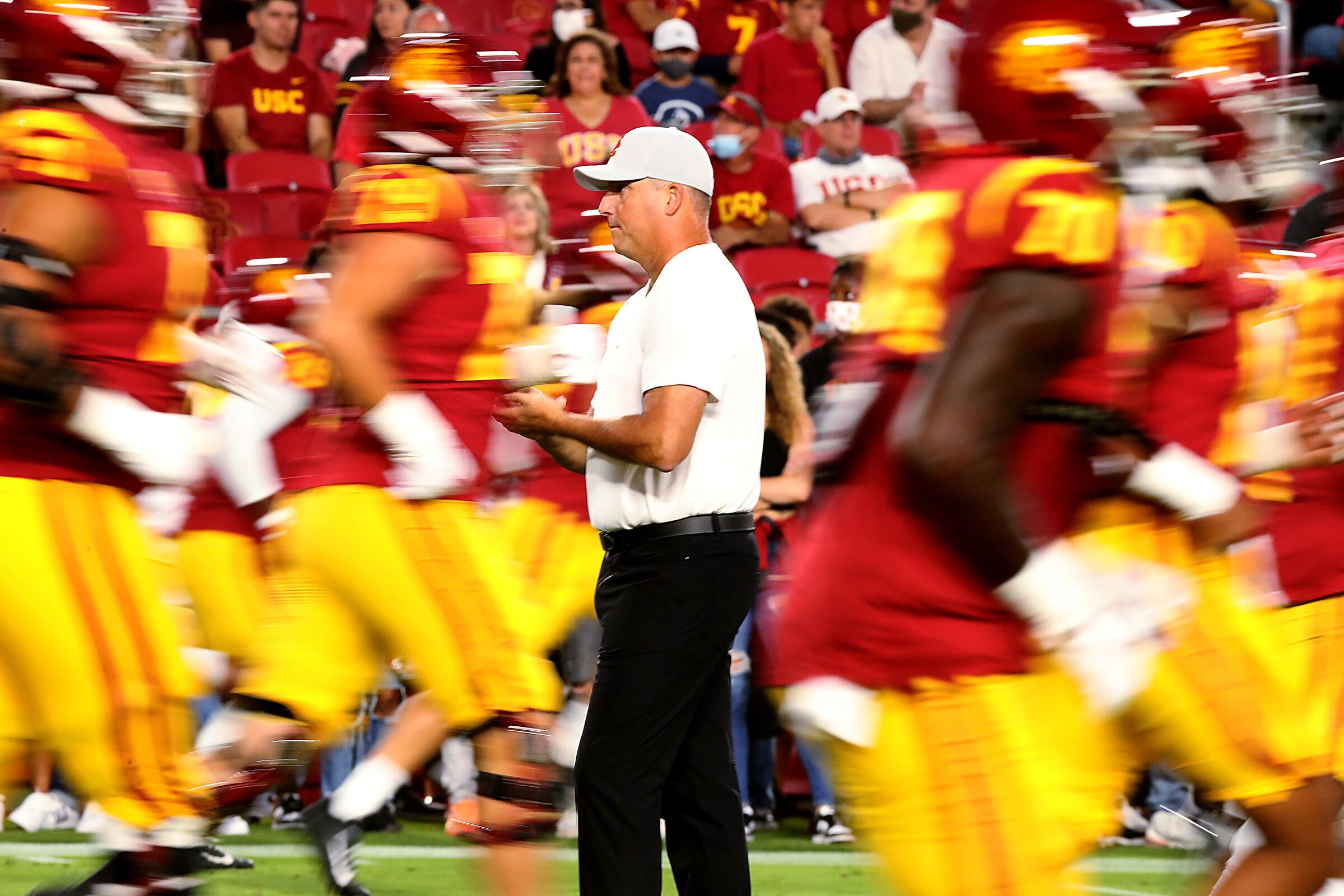
For a month after the firing of Clay Helton, the USC head coaching vacancy owned the conversation across college football. But hopefully athletic director Mike Bohn and Trojans fans didn’t get too comfortable hogging the attention — because now they’ve got competition. The serious kind.
Sunday, Louisiana State and Ed Orgeron, just two years removed from a magical march to a national championship, signed a separation agreement. Baton Rouge needs a new king, and it’s possible LSU athletic director Scott Woodward, known for swinging for the fences with hires, could be looking at some of the same candidates as USC.
In preparation for LSU coming open — I certainly did not expect it would happen after the Tigers beat rival Florida on Saturday — I spent last week assembling an informal panel of former coaches who have connections to Los Angeles and the West Coast to discuss the USC job, how it’s being viewed within the industry this time around, and the pluses and minuses of the position when compared to LSU and other coveted spots.
As USC and LSU leaders search for a new football coach, we evaluate which job is better.
Without further ado, the panel: Rick Neuheisel, the former UCLA, Washington and Colorado coach who lives in L.A.; Jim Mora, the former UCLA coach who grew up in L.A. rooting for USC; Dave Wannstedt, the former Chicago Bears, Miami Dolphins and Pitt head coach who was an assistant at USC in the 1980s; and Mike Stoops, the former Arizona coach.
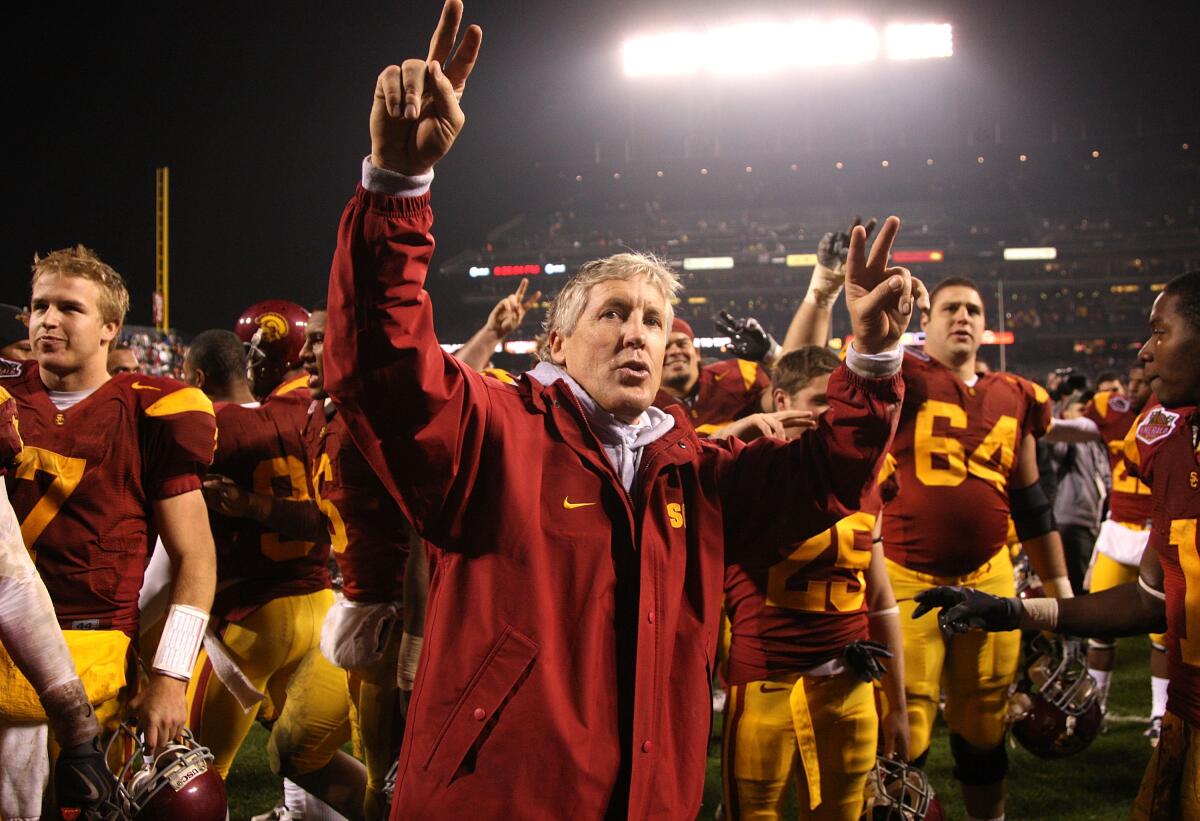
Neuheisel: I think there’s going to be some hesitation for the marquee coach. Because he’s looking at it compared to other marquee jobs. LSU, you’re the only big school in the state. We know what kind of defensive line talent grows up in the state. That’s why Nick Saban left Michigan State for LSU. Louisiana doesn’t have the state income tax that California has. The cost of living is less. But anybody who has been close to the action, who has been in the Pac-12, been in Los Angeles, was around in that Pete Carroll heyday, knows how powerful USC can be. I still believe it’s a top-three job in the country.
Stoops: I always thought that would be a dream job for most coaches. I always looked up to Pete Carroll. They were the standard before Nick Saban’s run. Iconic program with iconic coaches and players.
Q&A: Pete Carroll on struggles of USC football since he left: “If you’ve got a masterpiece are you going to try to do it again? I don’t know. I think it’s a big challenge.”
Wannstedt: It’s a top-10 job. I’m not going to say it’s a top-three job in the country. But I lived it. I recruited players from all over the country, and you go in and you put your hand out and say, “I’m from USC,” you’re going to get players’ attention before you say another word. And that’s what makes USC special, what separates them from a large majority of schools.
Mora: People in the industry still see it as one of the top jobs in the country. Now, whether that’s top five, top 15, I don’t know. I know for certain it used to be viewed as a top-five job. But given the changing climate of college football and the struggles that USC has had over the last several years, and the fact that so many Southern California kids are finding their way down South in recruiting, I don’t know if it’s viewed as a top-five program anymore. However, I believe it can be again. It’s still USC. It’s still the tradition, still Southern California, still the Coliseum, still the Pac-12 and the Rose Bowl. The amount of history at that school is unique.
Wannstedt: The first year I went to USC in 1983, we were on probation and couldn’t go to a bowl game. Then we went to the Rose Bowl in 1985 and beat Ohio State. I say that because when you look at the great programs that have had difficulties, whether it be probation or major setbacks, it doesn’t take them long if they get the right person before they can get back in the saddle at that elite status.
Mora: Some programs that are going through transition, you can say, boy, they’re a long way away. With USC, you wouldn’t say that. You just tweak a couple things, they’re right back in it. Getting quality big men, especially along the offensive line, is paramount. But you always feel like they’re just a step away from re-entering the national conversation of who are the best teams in college football.
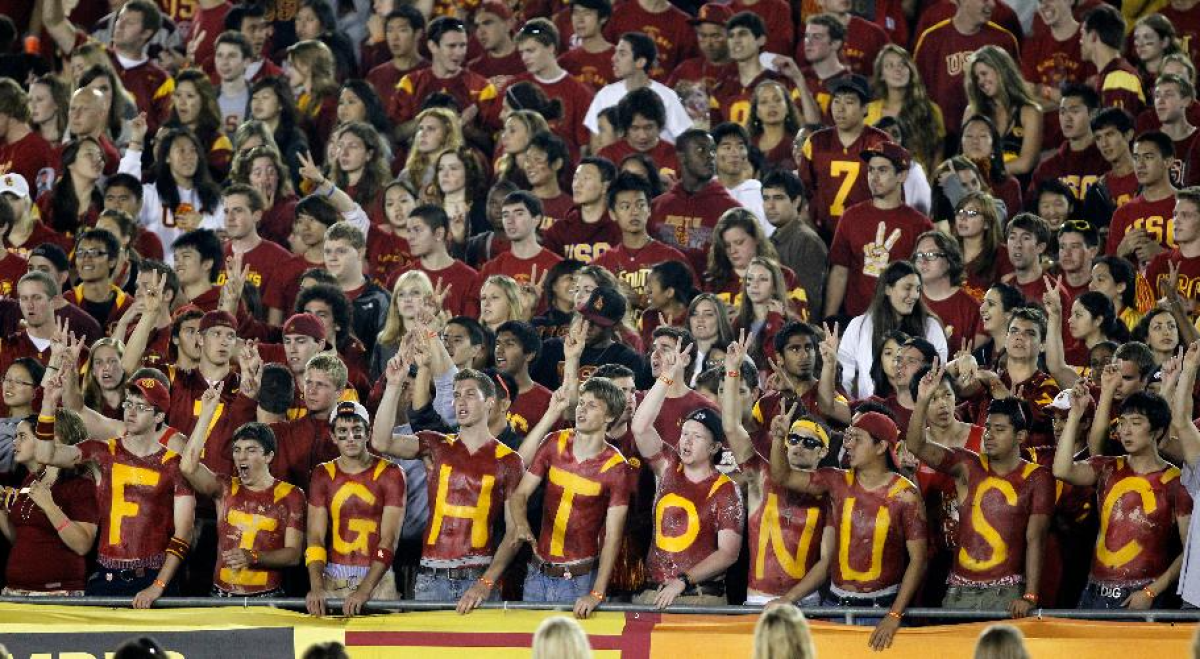
Mora: I was at ESPN for three years, and West Coast football barely exists in that building. Unless you’re talking about USC. It was crazy, absolutely crazy. And frankly the Pac-12 in those three years didn’t deserve a whole lot of conversation. But there was always that intrigue of: “What’s happening with USC?”
Neuheisel: You have to have a strong USC. A strong UCLA goes a long way, too, but Los Angeles has to be into college football. We went 20 years without pro football in L.A., but now that pro football is back and back in the way that both the Rams and Chargers are playing, you have to get this right. It’s absolutely critical that USC gets this right because it’s not only the fate of USC football but the fate of Pac-12 football hinges on it.
Mora: I’m a West Coast guy, so I want the West Coast to be prominent again. And the reality of the whole thing is the West Coast doesn’t become prominent unless USC is prominent. Because we’ve seen Oregon in the College Football Playoff and Washington and Coach Pete [Chris Petersen] in the playoff, but it’s a one-time shot, and then they kind of fall off or don’t get back. For West Coast football to be relevant again, really relevant, it’s up to USC.
Neuheisel: There is no reason why USC can’t be the same operation that happens at Alabama, that happens at Clemson, that happens at Ohio State. USC is that powerful of a brand, and the Pac-12 is desperate for it to happen, because the rising tide carries all boats. The rest of the Pac-12 will get better because of it. Players will stay home, will stay in the conference footprint.
Mora: It’s hard to coach in L.A. as a college coach. Let me give you a couple reasons. If you’re the head coach at Penn State, you can live a couple blocks off campus, and you can have a nice house where the kids on your team can come over for a meal or to hang out, and you can have a real family atmosphere that I think kids crave at that age. Those are valuable things when you’re building a program. And one thing that’s really different and difficult about L.A. is you have to live quite a way from the campus. I lived 18 miles from UCLA, and you’re fighting the traffic. If you ask the kids to feel welcome at your house, they just can’t get there. That doesn’t sound like a big deal, but it is if you’re the college coach as opposed to the NFL coach. In college, the family element is so important. I wanted my children around the program and our players at UCLA, but it was hard because they had to travel so far to get there. When I was a young kid, my dad coached at Colorado, and we lived a bike ride away from the campus. There was a bond that was created. That’s something you have to overcome. It’s not for everybody.
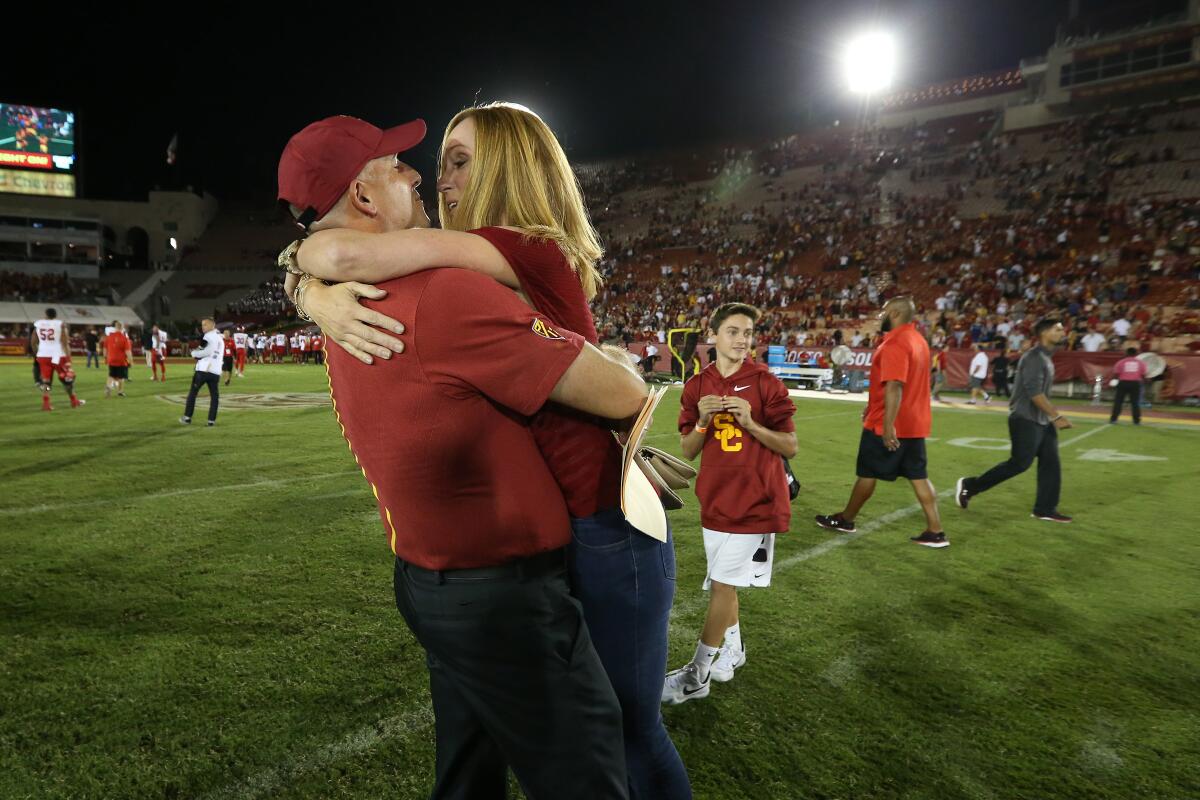
Wannstedt: It’s a tough enough profession, and, you know, the people USC is talking to, the quality of life has to be somewhat in line for them, just like the coaching job.
Neuheisel: It depends on where they are in their life. If they’ve already made a bunch of money, they won’t worry so much about the taxes.
Mora: They keep saying James Franklin, and I keep trying to figure out, why would James Franklin want to come to USC? He’s at a good school, he recruits well, it’s very competitive in that division. I think he likes to compete. From what I’ve seen, he’s paid well, it’s a great place to live, with the cost of living, the family atmosphere. It’s much different than Southern California. My mom went to USC, my dad got his master’s at USC, and I have two kids that graduated from USC. I have a high regard for that program, but I go, OK, what is the allure of USC over Penn State? Other than money. And it has to be a lot of money, because it’s a different lifestyle in Southern California.
Wannstedt: College football is all about recruiting. It’s the lifeline. When you’re in Southern California, you’re in a hotbed of talent within driving distance to fill that need.
Mora: In the era of the transfer portal, kids are always going to want to come to USC. In terms of name, image and likeness, I think there’s more opportunities in Southern California than probably anywhere else in the country.
Neuheisel: Imagine being in Los Angeles, wearing your USC shirt or tie and going to all the major corporations with USC blood and going in there and saying, “I want you to endow a block of money that is basically going to pay for our tight end position to be an advertiser for your company.” Right now, because the NCAA drug their feet so badly, you can go build an NIL opportunity to keep the kids in Southern California home and you can build a team faster than you can say “lickity split.” Go get a guy who knows how to build a team, fill the Coliseum, get Hollywood back on the sidelines, and boom, presto, you’re in the playoff and [Pac-12 Commissioner] George Kliavkoff is breathing a sigh of relief.
Wannstedt: Some of these programs can almost overthink it, you know? You can talk yourself out of anyone and shoot holes in anyone. I just hope that USC doesn’t fall into that trap where they have a vision of who they want, but then that guy’s not going to walk in their door, and it might be a coach that at the end of the day can win them championships but he might not look like the picture in the magazine they’re all hoping for. I think sometimes they get too hung up on oh, he’s got to be able to relate to people in Hollywood. You can definitely overthink it and miss out on some great football coaches if you aren’t careful.
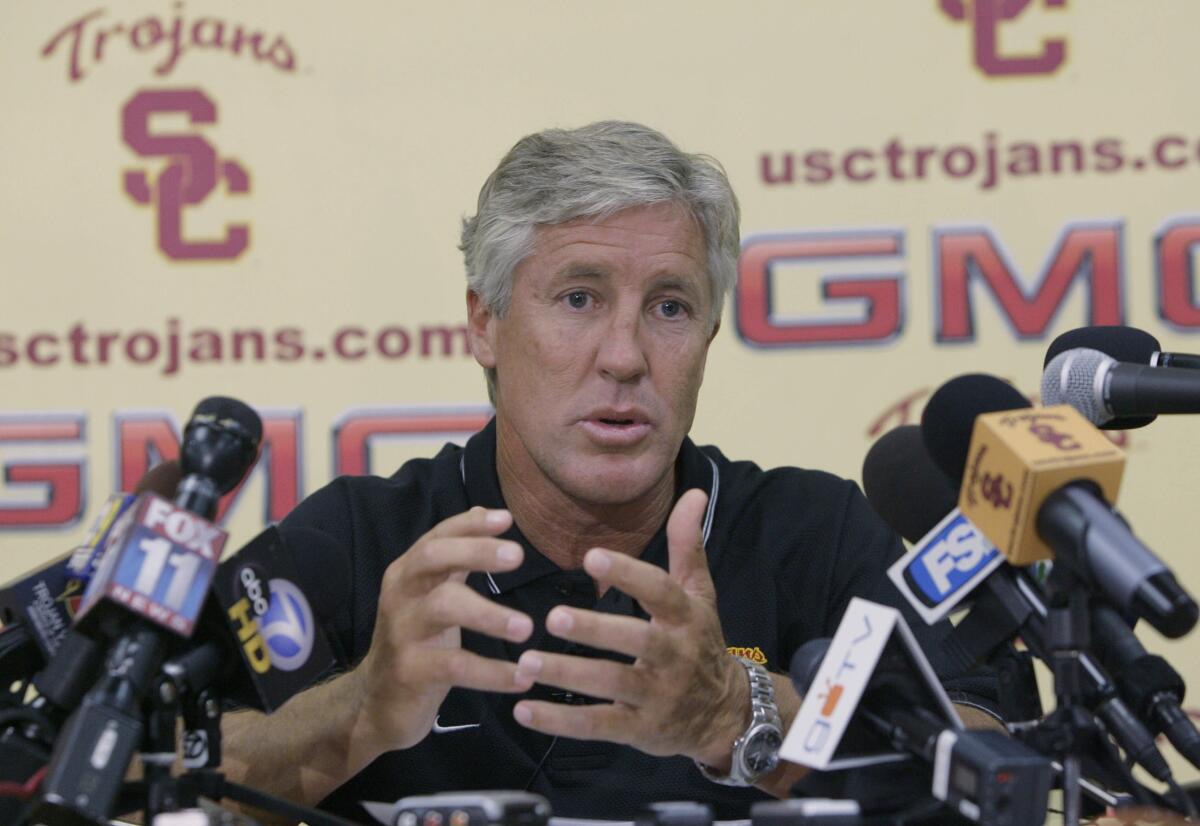
Mora: Everybody wants a name or someone that’s coming from a winning program right now, but there are a lot of coaches out there that are either unknowns or have had some success but maybe drifted into the back of people’s minds that are the right people.
Wannstedt: You can win the press conference, but at the end of the day, you have to win a championship.
Neuheisel: Los Angeles has so many different places to give your attention, so people always feel you gotta go get an attention-getting person, but the way you win attention is to win games. I think it’s important to remember that Pete Carroll wasn’t the splash hire.
Mora: He was the fourth choice. That goes to what I’m saying. USC doesn’t necessarily need these big-time names. It’s the guy that can come in there and bring that pride back into that program, engage alums, engage high school coaches, recruit and infuse toughness, discipline and accountability.
Stoops: It needs the right fit. A personality like Coach Carroll. He’s always been very real.
Neuheisel: Pete had been tarnished a little because a couple jobs hadn’t worked out, but he had the personality that L.A. kind of needs. When Steve Sarkisian got the job there, the final two choices were him and Chris Petersen, and Petersen said no. He didn’t want to do all that other stuff that didn’t fit his personality.
Neuheisel: If I were Mike Bohn, I would have a phone call into Chris Petersen to see if he’s interested in coming back and putting a team together with his vision. And then the other guy I’d call would be Brian Kelly. Think about it. What else can Kelly do at Notre Dame? He’s been to the playoff, he also coached in a national championship game. He’s never going to be able to recruit the guys that he needs to win that game. He’s already gone past Knute Rockne in wins. His kids are grown. Go live in L.A. where the sun shines all the time and get the recruits you couldn’t get at Notre Dame. It’s one easy pitch: You’ve done what you can do there.
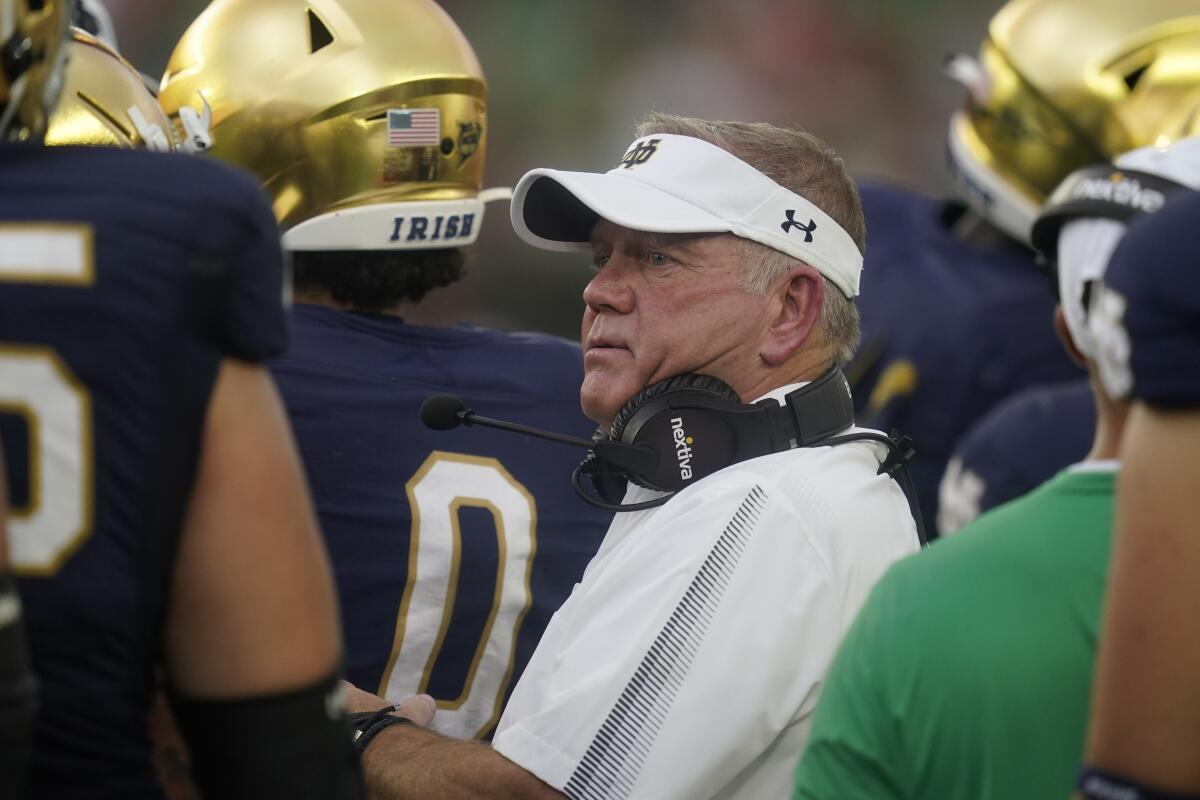
Wannstedt: Who knows? Who would have ever thought Jimbo Fisher would have left Florida State, right? You never know.
Mora: People think I’m crazy when I say this, but I would hire Deion Sanders. Now you can say he’s only coached for two years, but he’s doing it the right way. Deion is an amazing, amazing human being. The “Prime Time” persona was his way of marketing himself, but at the core, he is as fine a human being as you’re going to find. He cares about kids. He’s a big name people would respect immediately. He’s a recruiting magnet. Who wouldn’t want to play for Deion? I think he’s a natural.
Go beyond the scoreboard
Get the latest on L.A.'s teams in the daily Sports Report newsletter.
You may occasionally receive promotional content from the Los Angeles Times.